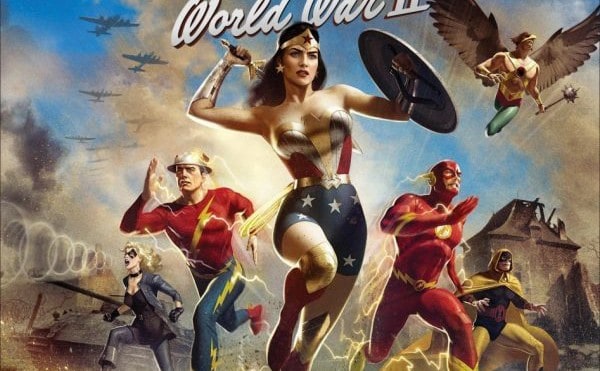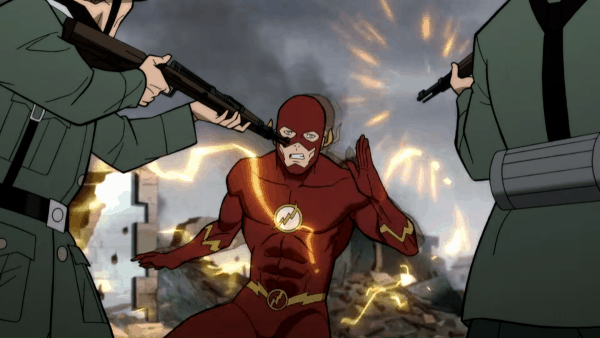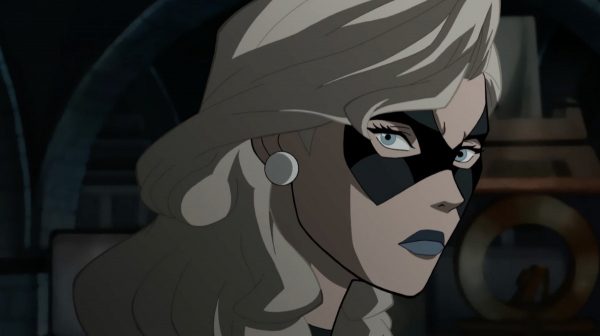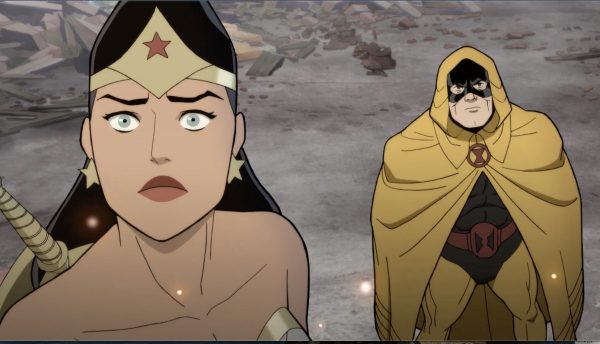Ricky Church chats with Justice Society: World War II co-writer Jeremy Adams…
Though the Justice League consists of some of the most popular superheroes in comics and has been around for decades, they are not the first superhero team in either the DC Universe or the comic book industry. In 1940 the world was introduced to the Justice Society of America, a group of heroes made up of those with superpowers, scientists or highly skilled people who went on adventures, fought supervillains and even took part in World War II, fighting for the Allies against Nazi Germany and members of the Axis.
The original line-up included characters like Jay Garrick and Alan Scott, the original Flash and Green Lantern respectively, Hourman, Doctor Fate and Hawkman with Wonder Woman and Black Canary being added to the team later. While the Justice Society may not be as popular as the Justice League now, the JSA was a pretty big title for several years after its creation and remains a favourite among fans, so much so when DC wiped away the JSA out of continuity in their 2011 reboot many fans cried foul.
In a few weeks the Justice Society will receive their first feature length animated adventure Justice Society: World War II, the latest film in DC’s line of original animated movies. It follows Barry Allen’s Flash as he accidentally travels back in time, landing in Nazi-occupied France and meets the Justice Society, a team of secret superheroes led by Wonder Woman. Flash teams up with them to uncover the Nazis’ latest scheme and find a way to travel back to his time. We got to chat with the co-writer of the film Jeremy Adams, who recently wrote Batman: Soul of the Dragon (read our review of the film and our interview with Adams). Our interview features Adams’ thoughts on the Justice Society’s popularity, placing the film in WWII era rather than modern day, how they chose the team line-up and more. Check out our interview below…
Ricky Church: Jeremy, nice to talk to you again! How are you doing, are you excited?
Jeremy Adams: I’m always excited! This movie, I’m excited about it. I’ve started writing The Flash so my first comic comes out. My first Flash comic comes out this month which is exciting. And it’s great. I mean, listen, I’m getting paid for all the things I was bullied for! So this is awesome.
So you have co-written Justice Society: World War II. One of the most interesting aspects to me about it is that the team has some of the oldest characters in comics, like the first generation of superheroes. What was the appeal of adapting these characters?
I think part of the appeal is that it hadn’t been done for animation. We got to not just do it, but when you see how good it looks, it’s like, man, we get to do it right. I guess that’s the best way to put it! I love the characters. I love the simplicity of the age in the way it’s a straight up fight of good versus evil. And so I feel the lines are very clear and I think what we tried to do at least was give you enough twists and turns that you’re going to enjoy that as an audience. Jeff [Wamester], who directed the film, and Butch [Lukic, supervising producer] they just really nailed it. It looks so beautiful and it feels so epic and so big. That’s amazing, that’s amazing to me.
The JSA of the movie consists of some original members and some other characters who were added later, such as Wonder Woman and Black Canary. How did you guys choose the team’s lineup?
So we basically put up a list of all the JSA members and then it was kind of a combination of who did we individually like and who would be most effective in this particular story that we wanted to tell. It would also be like, a character like Green Lantern Alan Scott might be a little more expensive. You’ve got to animate all these constructs and you’ve got to do this and ‘Hey, they don’t need to get a submarine, they can just have him do this’ or ‘Oh, they don’t need to do this because he can just catch the airplane’. There’s a power set that we took off the table so that we can allow these other kind of grunt guys to shine a little bit. Listen, I mean, it’s one of those things that I wish everybody buys like a billion copies so that they say ‘Hey, we need another JSA’ and I’m sure Megan and I would be happy to write one that takes place in the Pacific with Wildcat and Dr. Midnight and everybody else which would be great!
For sure. Now you recently wrote Batman: Soul of the Dragon which was a throwback to the 1970s Kung Fu genre. How did you bounce from a film like that to a World War II adventure with the Justice Society?
I want to hit all the generations. You don’t understand! As a writer, I think of what is really fun and, you know, these aren’t adaptations. Batman: Soul of the Dargon wasn’t and neither is this one. They are kind of variations on themes and things that have happened in the comics, but they’re original stories. My viewpoint is I’m always wanting to be working in superheroes and comic books and stuff like this. Being allowed to play with the toys and be able to tell a story, I’m beyond thrilled and I know Meghan is too, but it’s also about, hopefully, people getting excited about the characters and maybe they want to seek out more and they’ll pick up some of the comic books that we pulled so many ideas from.
I’ve said it before, but we’re standing on the shoulders of giants. The fact is that we don’t get to tell these stories if it wasn’t for the hard work of the people that have written JSA and drawn JSA and publish it for years prior. So it’s exciting. It’s exciting to write something where no one knows what’s going to happen when they go into it. That to me is a superhero movie. They don’t know, you just don’t know what it’s actually going to be about and that was exciting for Soul of the Dragon. It comes with its own pitfalls, but I’m glad that we got to do it.
Of course, Batman and his allies in Soul of the Dragon are very different from the JSA. Was it hard for you to go from the more grounded heroes to the fantastical ones of like Flash, Hawkman and Wonder Woman?
No, I mean, I’ve grown up with these characters and these heroes for so long and I think probably Megan is the same way. They’re almost like relatives at this point because you spend so much time reading about them and kind of know who they are. So with Soul of the Dragon I have a deep love of DC martial artists so I kind of knew who those characters were and then with these characters, I knew who these characters were.
If you’re doing G.I. Joe and you wrote Snake Eyes as a gabby teenager, that wouldn’t be right. It’s just like, no, I know Snakes Eyes, he doesn’t say anything, he just shoots people and fights with them. It’s like ‘Okay. I know what that is’. I know Superman is going to be a friend and I know that Batman is going to maybe be a little more gruff. Those are people that I’ve grown up with in a way so getting to play with those toys I kind of already knew how to play with them.
As you’ve mentioned, you co-wrote this movie with Meghan Fitzmartin. How did you two work together? What did she bring to the table that helped you?
We worked very well together. I had met her while she was working on Supernatural and then I had hired her later on to be on DC Superhero Girls when I helped story edit some of those. She’s a phenomenal writer, but beyond that she’s a wonderful person and she has this ability to draw out emotion and interpersonal complication. Her joke is she wants people to ship things and she ships everybody, but also like boosting up the drama elements which is a much needed additive for something like this. I think I probably skew more toward silliness and action so I think together it kind of created this fun adventure that has real dramatic stakes. So kudos to her for keeping me out of sillyville.
Do you have a favourite member of the JSA? If so, who and why?
Now I do! Before I went in I had this weird itch, I would love to do more with Hourman. I think Hourman is really interesting. I think I pitched a Justice League Action with Hourman where it was like you’d have a timer that was counting down where he had to go and beat up some Nazis. But after seeing the film, what was interesting is that Black Canary in this version of the movie really popped for me, like really for whatever reason. There’s a scene where she drops her mask and she’s just hurting and I’m like “Oh my gosh, this is really good. Really, really good.” Kudos to Wes Gleason, our voice director, but Elysia Rotaru who does the voice of Black Canary. She just really brought that character to life in a way I didn’t expect.
Speaking of Black Canary, the film is really well animated and some of my favourite moments are the displays of Wonder Woman, Flash and Black Canary’s power. Were those sequences where they’re showing off their power difficult to write and how do you feel seeing it brought to life?
You know, nothing I wrote could compare to what the storyboard guys, Butch and Jeff did. When I saw the movie, it just feels like there’s a level of sophistication in the animation and artistry that is so beautiful and it’s so cool looking. They took whatever words we had and ran with it and did something even more. I had that same experience with Mortal Kombat too, where I was like, here’s my extensive fight scene and then they went bananas and you’re like ‘Oh, that’s so much better’. Because of the collaborative art form, it’s all about us trying to get other people excited and then let them use their amazing skill and artistry to blow it out the door and they did. I mean, they really did.
You mentioned at the beginning that you’re writing The Flash in the comics soon. That’s pretty cool! Did you have anything to tease about that?
Yeah, it’s Wally West. I think what’s great about Wally West is, you know, Wally West fans like me, I think we feel a little bit like abuse victims where we’re just going flinching a little bit and going “Oh no, what are you going to do to Wally?” Because I get to do it now, I’m going to really push in on the fun and adventure and I want to explore Wally for as long as I can, but I don’t want anybody to think that I’m going to mistreat my boy. I’m excited. I’m excited.
Thank you very much to Jeremy Adams for speaking with us!
Justice Society: World War II will be released on digital April 27th and Blu-ray May 11th.
Ricky Church – Follow me on Twitter for more movie news and nerd talk.















